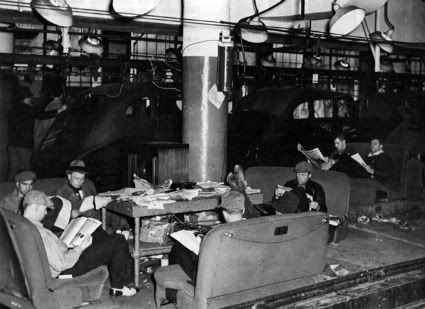UAW marks 75th anniversary of Flint Sit-Down Strike

Flint - In February 1937, Geraldine Blankinship was a vivacious 17-year-old in
a red beret and cape, dodging police and company thugs to get food to her father and thousands of other striking auto workers occupying General Motors Co.'s Fisher No. 1 body plant and other nearby factories.
Today, the United Auto Workers will mark the 75th anniversary of the victory they won over GM - a victory that forced the company to sign the first national contract with the union and sparked the growth of the U.S. labor movement. It is a victory that Blankinship and other veterans of what became known as the Flint Sit-Down Strike say is as important in 2012 as it was in 1937.
A Flint native, Blankinship remembers her father, Jay Green, coming home so tired after days of forced overtime at Fisher Body that he would fall into bed without pausing to eat. She also remembers the long, hot summer of 1936 when he came home with stories of workers collapsing from heat exhaustion.
"People on the line working were told, 'Just step over them until we can get them out of the way,'" she said. "He got tired of being a slave."
So did many of Green's co-workers - which is why Blankinship was sent upstairs one night in December as her father and other members of the fledgling UAW huddled around the family dining table and whispered the word strike.
Richard Wiecorek heard a lot of whispering, too, the next day in the cafeteria at the Fisher No. 1 plant. But he returned to his place on the assembly line and waited for it to start back up. It never moved.
Wiecorek, now 95, can still remember the foreman sending a man down the line to find out what the problem was.
"He said, 'The boss wants us to start the line,'" Wiecorek recalled. "One of the guys I knew (from the union) said, 'No, this line ain't starting!'"
Wiecorek and his co-workers were called back to the cafeteria, where they were told by UAW leaders from Detroit that the plant was on strike. Blankinship's father was elected vice chairman.
Instead of picking up picket signs, they were going to sit down and refuse to move. It was a move aimed at keeping GM from bringing in strikebreakers or moving the equipment to another factory.
---------
Source has more, including more pictures